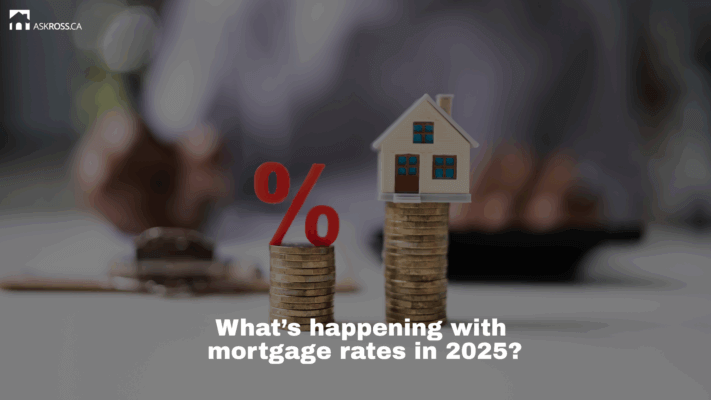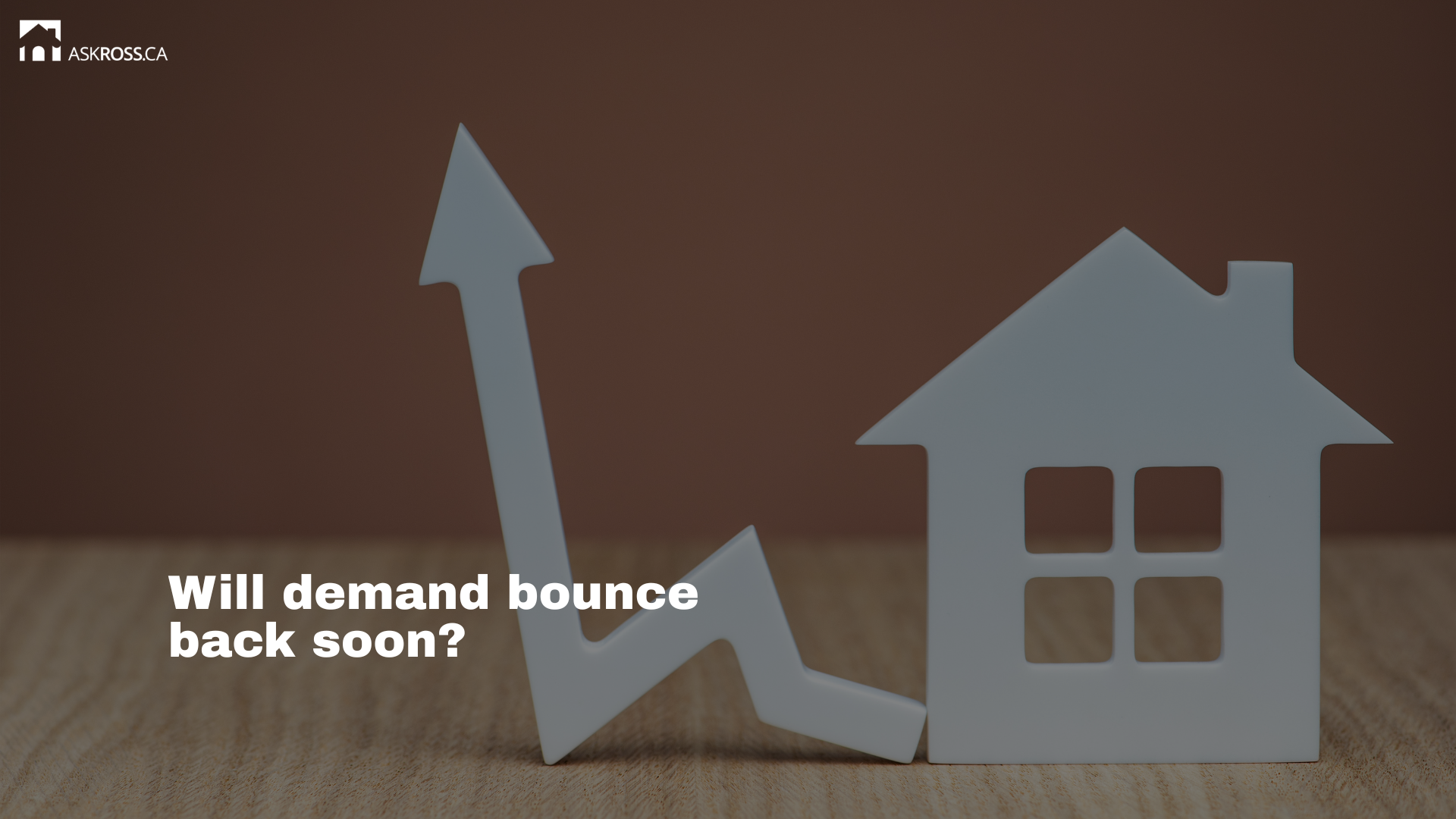
Published: May 15th, 2025 • Last Updated: May 19th, 2025
Author: Ross Taylor on AskRoss.ca
Is Now a Good Time to Buy a Home in Toronto? What Buyers Need to Know in 2025
If you’ve been thinking about buying a home in Toronto, or anywhere in Southern Ontario, you’re probably feeling torn right now. Home prices are coming down, listings are up, and mortgage rates are (finally) stabilizing. But with headlines full of recession fears, trade tensions, and economic uncertainty, many buyers are stuck in limbo.
So what’s really going on, and should you buy now or wait it out?
Let’s unpack what the numbers are telling us, and more importantly, what they’re not telling you, so you can decide what makes sense for your situation.
Jump to a specific section in this article ↓↓
- What’s happening in Toronto’s housing market right now?
- Why are so many homebuyers in Canada holding off in 2025?
- What’s causing the slowdown?
- The silver lining – high inventory and slow sales mean more power for buyers
- What’s happening with mortgage rates in 2025?
- Will demand bounce back soon?
- What about the Toronto condo market?
- Should you rent or buy in Toronto right now?
- The bottom line: 2025 is a buyer’s market

What’s happening in Toronto’s housing market right now?
The Toronto Regional Real Estate Board (TRREB) has released its April 2025 numbers, and the data confirms what many buyers and sellers have been sensing for months: Toronto is firmly in buyer’s market territory.
Prices aren’t tanking anymore, but they’re not skyrocketing either.TRREB and other analysts expect modest price gains through the rest of the year, especially if interest rates continue to slide.
Here’s what stood out in TRREB’s report:
- Home sales are down 23.3% compared to April 2024.
- New listings are up 8.1%, with nearly 19,000 homes hitting the market.
- The MLS Home Price Index fell 5.4% year-over-year.
- The average selling price dropped 4.1%, now sitting just above $1.107 million.
And it’s not just one segment feeling the pinch:
- Detached homes: Down 21.7%
- Semi-detached homes: Down 10%
- Townhouses: Down 22.9%
- Condos: The worst hit, down nearly 30% in Toronto and 31.5% in the 905
What we’re seeing is a market full of inventory, but not a lot of buyers.
↑↑ Back to the list at the top ↑↑

Why are so many homebuyers in Canada holding off in 2025?
It all comes down to confidence. Or rather, a lack of it.
According to BMO’s latest Real Financial Progress Index, nearly three-quarters of Canadians believe a recession is looming; a sharp jump from 60% just one month prior. That fear is directly affecting homebuying behaviour.
Homebuyer hesitation by the numbers
Here’s what the BMO survey found:
- 67% of prospective homebuyers are waiting for interest rates to drop before making a purchase.
- 38% say they won’t buy or refinance unless rates fall to 3% or lower.
- 66% of millennials feel they’ve already missed their window to buy.
- While 59% of Canadians still view homeownership as a top life goal, half say it feels less attainable than a year ago.
- And here’s a sobering stat: 43% of recent homebuyers say they needed help from family to afford their purchase.
In other words, affordability remains a significant issue, and so is fear of making the wrong move in a volatile market.
↑↑ Back to the list at the top ↑↑

What’s causing the slowdown?
Toronto’s economy is resilient, but not immune. Slowing job growth, global trade tensions, and political uncertainty could throw a wrench into the recovery.
That doesn’t mean it’s a bad time to buy; it just means you must build a buffer into your plans. Don’t overextend, and make sure you’ve got an emergency fund in place.
Here are the two big forces at play here:
1. Trade war tensions are shaking confidence
The ongoing trade war between Canada and the United States, sparked by U.S. tariffs earlier this year, has caused a ripple of economic uncertainty. TRREB’s president, Elechia Barry-Sproule, put it bluntly: this is a top concern for many buyers across the GTA, and it’s keeping them on the sidelines.
If relations improve, we could see buyer sentiment rebound quickly. But for now, the market is watching and waiting.
2. Recession fears are growing
Whether or not a recession actually materializes, fear of one is enough to slow down spending. Add in job market jitters, inflation concerns, and the overall cost of living, and you’ve got the perfect storm for hesitation, even with lower mortgage rates.
↑↑ Back to the list at the top ↑↑

The silver lining–High inventory and slow sales mean more power for buyers
Now here’s the twist: even though buyers are nervous, the conditions in today’s market are unusually favourable if you’re financially ready to buy.
We haven’t seen this much housing inventory in years. Listings are up across the board, including condos, townhouses, and detached homes, you name it. And while that used to spark bidding wars, many of those properties are now sitting longer, with more room for negotiation.
If you’re a buyer, that means more choice, more time to think, and often, a better price. Sellers who need to move are getting more flexible, and some are throwing in incentives to sweeten the deal.
This could be a rare opportunity for homebuyers
- High inventory = more choice and less pressure. Sellers are having to work harder to attract offers, which gives you leverage.
- Lower prices mean better value. Prices are down 4–5% year-over-year, and in some neighbourhoods, even more.
- Interest rates are stable (for now). The Bank of Canada has held its policy rate steady at 2.75%, but that could shift again depending on inflation and global economic pressures.
- Demand will return. Immigration-driven population growth is still a powerful long-term force in our housing market. Once confidence returns, we could see another upswing in demand and prices.
So yes, uncertainty is high. But uncertainty also creates opportunity.
↑↑ Back to the list at the top ↑↑

What’s happening with mortgage rates in 2025?
The Bank of Canada’s overnight rate is currently holding steady at 2.75% as of May 2025, and the lowest 5-year fixed mortgage rates we are seeing are at 3.74% (insured) and 3.84% (uninsured).
Lower rates are helping, but not a silver bullet.
Yes, borrowing costs are improving. Fixed rates have come down from their 2023 highs, and variable rates are starting to look appealing again.
But remember: just because rates are lower doesn’t mean affordability has fully recovered. Wages haven’t kept up with home prices, and qualification rules haven’t changed.
Still, if you were priced out before, you should revisit your pre-approval; you could be pleasantly surprised.
↑↑ Back to the list at the top ↑↑

Will demand bounce back soon?
TRREB CEO John DiMichele made a key point: even with this surge in listings, the long-term supply pipeline is weak. New construction activity has slowed, and it’s not keeping pace with projected immigration and population growth.
Once buyers feel more confident, whether due to improved trade relations or clearer economic signals, demand will come back quickly. And when it does, we could see upward pressure on prices again.
↑↑ Back to the list at the top ↑↑

What about the Toronto condo market?
Ah, condos, once the darling of investors and young professionals alike. But 2025 is showing some cracks in that foundation.
Investor pullback is reshaping the condo landscape
Many investors who bought pre-construction are now facing negative cash flow thanks to rising costs and soft rental rates. That’s pushed more units onto the resale market and created some real deals, especially for end-users looking for larger or better-located condos.
If you’re willing to do a bit of homework and have a long-term outlook, there are some real gems out there.
↑↑ Back to the list at the top ↑↑

Should you rent or buy in Toronto right now?
This debate always comes up, especially when markets are in flux. There’s no one-size-fits-all answer, but there are some clear factors to consider in 2025.
Buying makes sense if you plan to stay put for 5+ years
If you’re financially stable and plan to live in your home for the next 5 to 10 years, buying in today’s buyer-friendly market makes a lot of sense. You’ll build equity, lock in a good price, and benefit from any future appreciation.
But if your job is shaky, or you may need to move soon, renting might still be the smarter choice, especially with some rental supply relief on the horizon.
↑↑ Back to the list at the top ↑↑

The bottom line: 2025 is a buyer’s market
Toronto’s housing market isn’t crashing; it’s cooling. And it’s doing so in response to external shocks, not because demand has evaporated. The fundamentals haven’t changed: we still have more people who need housing than homes available.
But right now, we’re in a window where motivated buyers have more power, more options, and potentially better pricing than we’ve seen in years.
If you’ve been waiting on the sidelines for a “better time,” this might actually be it.
Let’s take a look at your finances, see what kind of mortgage you’d qualify for, and talk about your options. Whether you decide to buy now or wait a bit longer, the key is making a move from a place of strength, not fear.
Want to talk strategy? Reach out to us anytime. My team and I are here to help you make smart, informed decisions that fit your goals.
↑↑ Back to the list at the top ↑↑

Ross Taylor Mortgages
If you want great service from someone you can trust – reach out to us today.
Get quick answers to your questions, no matter how difficult – 7 days a week.

 Apply For a Mortgage
Apply For a Mortgage